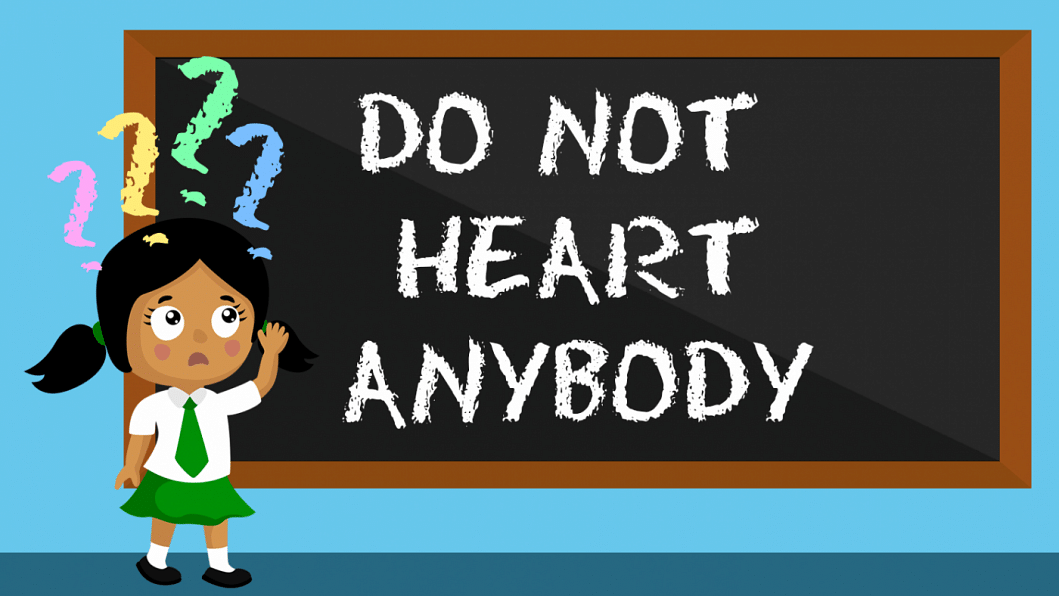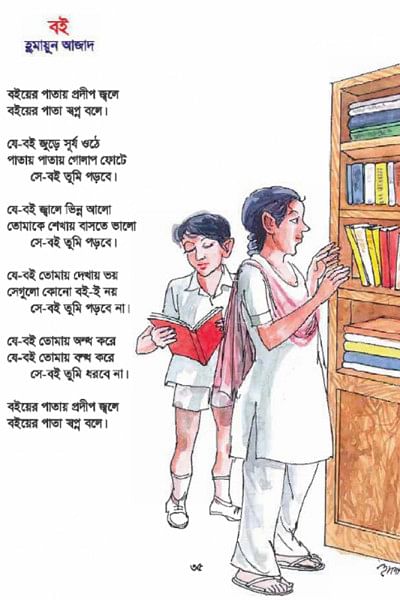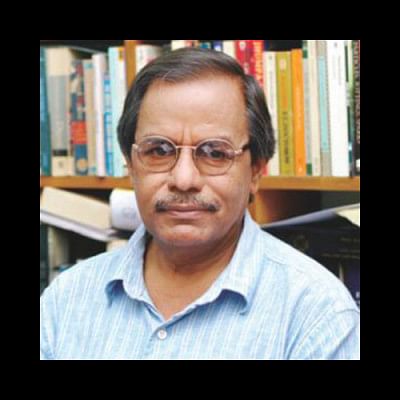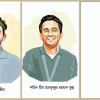Disturbing deviations in children's books

Over the recent backlash of the erroneous content and apparently mysterious changes to the curriculum, the education minister on January 10 stated during a press briefing, "I'm not avoiding my responsibility, but I'm leaving the matter to you whether handing over such a volume of textbooks is a bigger thing than these errors," to which, the answer is an obvious yes. Let us not belittle the achievement of the government in distributing 36.21 crore copies of textbooks among 4.26 crore students of pre-primary, primary and secondary students. We applaud the logistical feat. But to what purpose, if not education? Is our education minister effectively asking us to give priority to quantity over quality?
Social media has had a field day with the blunders of the recently published textbooks, starting from the dubious advice of "Do not heart anyone" to tree-climbing goats trying to get to mangoes. But beyond these errors, there have been some stark changes to the curriculum as well. And coincidentally, in the case of Bangla textbooks, these changes match exactly with Hefazat-e-Islam's demands for changes to the mainstream education curriculum.
MANUFACTURING COMMUNALISM
Shamsuddoza Sajen
Do we want our children to be fed on the ideology of superiority of one sect by excluding and demonising others? Do we want them to be ignorant about the creative works of legendary writers like Rabindranath Tagore, Sarat Chandra Chattopadhyay and Bharatchandra Ray only because they do not belong to a particular religion?
Worryingly, we are seeing such attempts being made through the exclusion of several poems and stories from the textbooks. It is alleged that those changes correspond with the demands made by Hefazat-e-Islam, a Qawmi madrassah-based organisation. Even after publishing more than fifty percent Bangla textbooks for classes 7 and 8, the authorities withdrew the books only because two stories were not dropped as demanded by the group (Prothom Alo, January 15). The government is yet to come up with an explanation about these omissions. But the religious groups have expressed their satisfaction over the fulfilment of their demands. And if one takes the logic provided by them and goes through the texts of the excluded articles it becomes clear that their claims are totally erroneous and baseless. A few examples follow.

The poem titled Boi written by Humayun Azad has been excluded from class 5 textbooks. This poem is about encouraging students to read books and avoid texts that teach parochialism.
It was claimed that this poem discourages students to read the Quran. Of course the above-mentioned text of the poem does not in any way allude to the holy text.
From the textbooks for class 6, Rabindranath Tagore's poem titled Bangladesher Hridoy has been dropped. This patriotic poem describes the beauty of the poet's motherland. It has been sung over the years as a patriotic song. But the communal forces are now claiming that the poem is a praise of a Hindu goddess.
Another omission made in the Bangla textbook of this class is the story titled Lal Goruta written by Satyen Sen. According to the propaganda of the religious groups, the story compares the cow with the mother and is thus preaching Hinduism. In fact Lal Goruta is a story about a cow reared by a poor man named Nidhiram and how he turns compassionate towards domestic animals.
The third exclusion in the textbook of class 6 was S. Wazed Ali's travel story Rachi Bhromon. The objection against it is that Rachi belongs to Hindus only. So a Muslim boy should not visit there and should not even know about it. They made a similar argument against the famous travelogue Palamou written by Sanjib Chattopadhyay which has been dropped from the textbook of class 9. This is taking a very narrow minded view of a delightful travel story.
The religious groups have demanded exclusion of the famous short story titled Lalu written by Sarat Chandra Chattopaddhay as, according to them, it teaches the rituals of Hindu animal sacrifice. But the whole story is contrary to their claim as it shares a story of a boy's compassion towards animals and how he took risks to stop the sacrifice of goats. The story has been dropped from the textbook of class 7.
For class 8, the abridged version of the epic Ramayana rendered for children by Upendra Kishore Ray has been dropped. It was also in the list of demands as they likened it to promoting Hinduism. The detractors miss the value of reading Ramayana which has been hailed as a treasure trove of wisdom. There have been dozens of translation of this epic text in both the Persian and Arabic languages. The Great Mughal Emperor Akbar appointed a great scholar Abdul Qadir Badayuni to translate Ramayana and Mahabharata in Arabic and Persian.
For class 9, Hefazat demanded removal of Lalon's song titled Somoi Gele Sadhon Hobena because according to them it promotes sexual perversion. The readers are urged to listen to the song and see what sexual perversity they can find in it.
Another example is the poem Sankota Dulche, a brilliant work by Sunil Gangopadhyay, which expresses that common culture and language cannot be separated by political boundaries and urges one to rise above the religious divide and share the treasure of Bangla literature and culture. The communalists demanded its exclusion claiming that the poem favours India's expansionism.
The above content analysis is enough to show how the claims of the extremists are based on sheer falsehood and ignorance. But unfortunately, all their demands for exclusion have been fulfilled. It does not matter whether you call it coincidence or acquiescence of the authorities. There has been for long a demand for modernising the archaic syllabus of the Qawmi madrassas, but all the efforts failed due to stiff opposition from the fundamentalist groups. Instead, they are now enforcing their demands on the national educational curriculum and the government seems to have given in to them.
The politics of exclusion in the textbook leads ultimately to the exclusion of the minority communities. It promotes the politics of exclusivity. It seems our young minds are increasingly becoming laboratories for fundamentalists and extremists propagating their views and ideologies. The innocent minds get fashioned in the beliefs which are inculcated in them through textbooks and the result is creation of a generation which is fed on communal ideology and distorted history. Is this the future generation we want?
WHO, AND FOR WHAT END?
Moyukh Mahtab
Over the prevarications and incredulity of those involved in the process of bringing out the textbooks, we must ask, who was responsible? It is quite bizarre that no one from the National Curriculum and Textbook Board (NCTB) or the National Curriculum Coordination Committee (NCCC), or the editors and the writers of the textbooks seem to know why or how these changes came to pass.
According to the rules, no changes can be brought to the textbooks without notifying the NCCC and the editors. The NCCC finalises the curriculum, which is then prepared by the writers and editors. Afterwards, it all goes back to the NCCC, which makes the final decision. The NCTB can only make minor corrections or modifications. And yet, 10 of the 23 editors of the Bangla textbook for classes 9 and 10 told the Prothom Alo on January 16, that they were not notified of any of the changes made.
Professor Mahbubul Haque, who was in the editorial committee for the textbooks of classes 6, 7 and 8, has stated that he was not told of any of the changes. These changes included the addition of 17 texts and discarding of 12 from the textbooks of classes 1 to 10; the same 17 and 12 as demanded by Hefazat.
So one would assume the responsibility would be taken by the NCCC. But members of the committees who oversee the primary and secondary levels told the Prothom Alo they too were unaware of who made the changes. Similarly, the NCCC members Md. Akhtaruzzaman (pro VC of University of Dhaka) and Shahin Kabir (also member of the National Education Policy Committee) were unaware (Prothom Alo, January 16). The editors, writers and compilers of the textbooks are now in the awkward position of having their names in books they might not endorse. In a joint statement, thirteen editors and compilers of classes I to X declared: "Against such a backdrop, we are stating for all, including students, teachers and guardians that we were kept in the dark about the changes made in the textbooks."
Although the books mention that they were reprints of the 2013 curriculum, the changes to the books make them completely unrecognisable. The books mention that the contents were fine-tuned and modified by five persons.
In this strange situation, there have been calls for the resignation of the education minister and it has been said that the editors of the books cannot wash their hands off the matter. But the final decision of what goes and what does not is supposed to be the NCCC's. They too appear or are unwilling to say on whose decision and to what end these changes were made. And given the communal implications of the changes, these are important questions that need to be answered. Is education being made a tool for political gain as Professor Serajul Islam Chowdhury has alleged? An appeal to the error-prone ways of human beings may conciliate the matter of spelling and grammatical errors, but it cannot absolve the authorities of turning education into an ideologically and politically motivated matter.
Committees have been formed to look into the matter, but in the end, the vacillation of the authorities is clear. If not the writer and editors, the NCTB or the NCCC, or the education minister, then who is accountable? Suspension of the designer for a minor error is all well and good, but does it not take our attention away from the bigger issue at hand here: the wilful tampering, due to political or whatever reason, with the material school children are supposed to study?
WHY THIS GLARING NEGLIGENCE?
Nahela Nowshin
What are the implications of the recent textbook fiasco? Will the changes in the textbooks foster an educational environment that promotes the analytical faculty of the mind, i.e. do we want youngsters to be able to think critically? Or have we decided for ourselves that select 'experts' are best disposed to dictate what can, and most importantly, what cannot, be taught to hundreds of thousands of students?

When asked about the blunders in the textbooks distributed by NCTB, eminent writer and academic Professor Syed Manzoorul Islam expresses disappointment about the changes: "It seems that some people have suddenly become 'experts' in deciding what is good for a child. For example, the juktakkhor (combined letters) has wrongly been dropped to make the spelling "easier" for children. Now, who takes such decisions? Where are the scientific and linguistic proofs that children can't master combined letters? Children have been taught how to use them for ages, why the sudden change and the unacceptable excuses? I believe children should be taught their mother language in all its form, even if some appear complex. There is no scope for experimentation in textbooks by people who are not real experts."
School textbooks are the first things that students encounter in an institutional setting and they are the basic foundation of their intellectual development. Along with the need to spare no efforts to make textbooks error-free, Professor Islam further states, "If textbooks don't have all the colours of life then reading becomes routine and the mind doesn't develop fully. In every country, textbooks are prepared with extreme care. Why can't the NCTB employ expert proof-readers, say from newspapers, who do a very fine job?"
More lamentable than the grammatical and illustrative errors, however, is the allegedly deliberate omission of some poems by Hindu and liberal poets—what can only be interpreted, to a logical mind, as the infusion of communalistic sentiments in the realm of education.
Professor Islam discusses the effects this may have on the development of the critical faculties of students and questions why the Hindu-Muslim divide, a vestige of the Pakistan era, is seemingly being revived: "The exclusion of works by some Hindu and liberal writers goes against the spirit of education. Ideally, education should create active people. This is a thought echoed by Emerson who said that a person who thinks is a proactive person—an active mind that questions, and believes in rationality. A child who is not given an authentic education grows up to become a truncated individual, not a fully developed one. Our rich literary canon has contributions of Muslim, Hindu, and Buddhist authors and thinkers just as people of all religions fought side by side in our war of liberation. The omission of some writings by Hindu and liberal writers can be interpreted as the communalisation of education."
Many have claimed that this is a sign of the government surrendering to the demands of Hefazat-e-Islam and Bangladesh Awami Olema League—two groups who have previously asked that some poems and prose by Hindu and liberal writers be dropped from the curriculum. Professor Islam, who sees no proof of Hefazat or Olema League's involvement, asks why the government felt compelled to bring these changes. "I don't know why the government felt there should be changes all of a sudden. The responsibility lies with the Ministry of Education and NCTB. They alone can answer why these changes have been made. Hypothetically speaking, if the government did succumb to political pressure, then who is this political entity that is bigger than the government?"
"Some of the best minds of the country were involved in the process of compiling the books and the fact that they were not alerted about these changes points to high-handedness which is not acceptable. NCTB and the Ministry of Education should clarify who made these sudden changes and why. They must give us an explanation," reiterates Professor Islam.
That isn't where the lack of transparency stops. In addition to silence on the curious timing and reason for the changes, there is also a lack of clarity on who makes the final decision on what goes into these textbooks and what the review committee—set up by the NCTB to probe into the textbook errors—is doing.
"We don't know the terms of reference of the review committee. We don't know what exactly they are looking at — whether it's the grammatical errors, exclusion of selective writings or why editors were not made aware of the changes," says Professor Islam.
The writers are members of the Editorial team at The Daily Star.










Comments